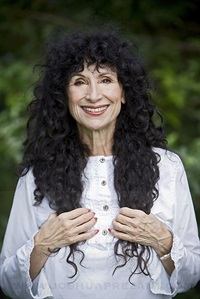EP13 Invited Keynote 05 - Love In A Time of Illness - Diane Ackerman, PhD
- Average Rating:
- Not yet rated
- Topic Areas:
- Keynotes | Love | Marriage | Neuroscience | Psychotherapy
- Categories:
- Evolution of Psychotherapy | Evolution of Psychotherapy 2013
- Faculty:
- Diane Ackerman, MFA, PhD
- Duration:
- 1 Hour 01 Minutes
- Format:
- Audio Only
- Original Program Date:
- Dec 12, 2013
- License:
- Never Expires.
Description
Description: This keynote is a deeply personal story about love, caregiving and the brain’s ability to reinvent itself after catastrophic injury. Diane Ackerman shares her husband’s stroke and aphasia, the surreal early days of recovery, and the creative, highly individualized methods she used to help him re-learn language and rebuild a life. Participants gain an intimate look at neuroplasticity, resilience, and the emotional transformation of long-term caregiving, illuminated with humor, devotion and hard-won insight.
Syllabus Description: Ms. Ackerman will be speaking about love in a time of illness, something she has lived with for many years, and has written about in her most recent book, One Hundred Names for Love. One day, Ackerman’s 74-year-old husband, a gifted author and professor, suffered a savage stroke. When he regained awareness he was afflicted with “global aphasia”—total loss of language—and could utter only a single syllable: “mem.” The standard therapies yielded only frustration. Diane soon found, however, that by harnessing their deep knowledge of each other, and her understanding of language and the brain, she could guide Paul back to the world of words. In the process, she learned unexpected lessons about herself, their marriage, the underappreciated art of care-giving, and the brain’s ability to heal itself. By necessity, the couples’ lives changed dramatically. The challenge was to regain what could be found, reimagine what couldn’t, and, by using unusual tools and methods, create a new love story.
Educational Objectives:
- Develop a better understanding of how illness can transform a marriage by skewing roles, dislodging routines, spawning unexpected new behaviors, and ultimately revising a sense of self.
- Learn how a ravaged brain can rewire itself with the help of healing relationships and a creative game-plan tailored to the individual (however eccentric he may be).
*Sessions may be edited for content and to preserve confidentiality*
Credits
Faculty

Diane Ackerman, MFA, PhD Related Seminars and Products
Diane Ackerman, MFA, PhD, is the author of 23 books of poetry and nonfiction, including most recently One Hundred Names for Love and The Zookeeper’s Wife. Of late, she has been writing on "nature and human nature" in the Opinion pages of The New York Times. She has the somewhat unusual distinction of having a molecule named after her—dianeackerone (a sex pheromone in crocodiles). She has taught at a number of universities, including Columbia and Cornell. Her essays about nature and human nature have been appearing for decades in The New York Times, Smithsonian, Parade, The New Yorker, National Geographic and many other journals. She hosted a five-hour PBS television series inspired by A Natural History of the Senses.


